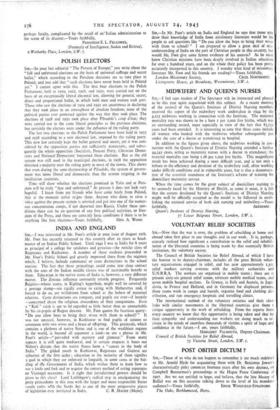INDIA AND ENGLAND
• SIR,74 was interested in Mr. Foots article in your issue of August xoth. Mr. Foot has .recently returned to this- country after so years as head- master of an Indian Public School. Until 1942 I was in India for 8 years as principal of a college for talukdars and girasSias—the roitckt class of Rajputana and Kathiawar. A number of these students proceeded to Mr. Foot's Public School and greatly improved there from the regimen which, I believe, forbade communal or caste distinetiOns in the school routine. The fact that these. princelings. could come, into close contact with the sons of the Indian middle classes was of inestimable benefit to them. Education in the native states of India is, however, a very different matter. The Zenana influence constantly retards progress. Frequently Rah:hits—whose states, in Kipling's hyperbole, might well be covered by a postage stamp—are rigidly averse to eating with Maharattas and, if forced to do so, are withdrawn from school at the behest of maternal relatives. Caste distinctions are rampant, and pupils are ever—if latently —concerned about the religious antecedents of their companions. Even a "Koli " rajah is apt to be regarded as little better than an untouchable by his co-pupils of Rajput descent. Mr. Foot quotes the facetious query: "Do you allow boya- to bring their wives with them to school? " It was not unusual, however, in Kathiawar to find pupils of sixteen or seventeen with two wives and a brace of offspring. This peninsula, which contains a plethora of native States and is one of the wealthieit regions in the world, is beyond all argument a land—to use a phrase in Mr. Foot's article—" pervaded with mystery and glamour." From many aspects it is still quite mediaeval, and in certain respects it bears out Nehru's dictum that the native States form a " cancer in the body of India." The gilded youth in Kathiawar, Rajputana and Gujerat are sybarites of the first order ; education to the majority of them signifies a gaol in which they are enforced to languish, in some cases at the bid- ding of Me Government of India, which wishes them to learn how to use a knife and fork and to acquire the correct method of eating asparagus on Viceregal occasions. Is it right that jurisdictional powers should be given to this class? Lord Linlithgow's radical step in amalgamating the petty princedoms in this area with the larger and more responsible States surely ranks with the Sarda Act as one of the most progressive pieces of legislation ever instituted in India. C. R. MANDY (Major).






















 Previous page
Previous page